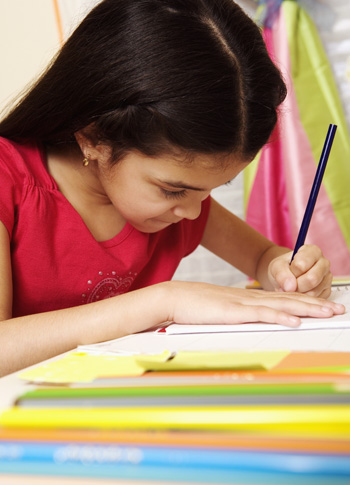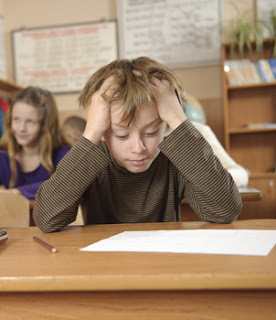Detecting learning problems in children
When a child has trouble processing the information received, he betrays his behavior. Parents should be vigilant and observe the most common signs that indicate the presence of a learning disability:
- Difficulty understanding and track tasks and instructions.
- Trouble remembering what someone just said.
- Difficulty mastering basic skills of reading, Spelling, writing and/or math, and thus fails in school work.
- Difficulty distinguishing between right and left, To identify words, etc. You can present tendency to write letters, words or numbers backward.
- Lack of coordination walking, playing sports or perform simple activities such as holding a pencil or tying a shoelace.
- Easy to lose or lose their school supplies, books and other items.
- Difficulty understanding the concept of time, Mistaking the "yesterday", with "Today" and/or "tomorrow."
- Tendency to irritation or to express excitement easily.
Characteristics of learning problems
Reading (vision) The child is very close to the book, says words aloud; notes, substituted, omitted and invests the words; sees double jump and read the same line twice, do not read fluently, has little understanding in oral reading; omitted final consonants in oral reading; blinks excessively, you cross when reading; tends to rub eyes and complain that itch, presents problems of visual impairment, poor spelling, among others.
Writing Invest and vary the height of the letters; leaves no space between words and does not write over the lines, grab the pencil awkwardly and has not determined if it is right or left handed, move and place the paper in the wrong way, try to write with finger, has a poorly organized thinking and poor posture.
Auditory and verbal The child shows apathy, cold, Allergy and/or asthma often, mispronounce words, breathe through your mouth complains Ear Problems And you feel dizzy, goes blank when spoken, speaks loud; depends on other visually and closely observes the teacher, can not go more than one instruction at a time, put the TV and radio too loud.
Mathematics The student spends the numbers, have difficulty knowing when, poor comprehension and memory of numbers, math facts does not answer.
Attention and concentration of children
The general attention required by any relevant change in his life has sometimes difficulties learning.
Attention: base learning
Tips to promote focus and concentration
1. Avoid distractions. Dispense with anything that may distract the child, personal problems, family, lack of focus, noise, etc.
2. Diversifying tasks. Change of subject or subject study intervals. The changes help you start the process of care and so the child can stay focused longer.
3. Create routines and study habits. It should start study every day at a set time to get a good cerebral performance. If a person gets used to make the effort to focus every day at the same time, after a few days will you make your mind to focus more easily then.
4. Mark times. It is necessary to set a time for each task or activity and do it exacted on schedule.
5. Organize tasks. Should perform the most difficult tasks when the child is most rested.
6. Focusing the mind. To be fully performance The concentration requires preheating, which may consist of a few minutes (no more than five) to cross out some letters (pick one) of a sheet of paper. You can then move on to the scheduled activity.
7. Set goals and objectives. It is very important that children have clear goals to be achieved. When we want something real and strong, mobilized many of our resources to try to reach it. Therefore, if the child has a clear goal in the study, most of you will to get it.
8. Collate breaks. The care process which usually follows a decay curve over time. Therefore, it is desirable to insert breaks to regain focus.
9. Synthesize and summarize. Mentally summarize what has been heard for an explanation and short phrases pointing details of more interest is a good technique to exercise care.
Getting good grades is a matter of effort and discipline. Having luck on exams means doing what is good and has worked with some guidelines for organization and basic techniques necessary for the study and will be easier to get good grades. Here are some tips, Aimed at identifying the most frequent difficulties in the study and implement the most appropriate intervention strategies in each case.
Occurs when the child studies, but does not devote the necessary time. In other cases, attempts to study at the last minute or in the hours passed, therefore is more tired, and you get the impression that you have studied and worked when, in fact, not the case.
Strategy. Planning is based on determining a daily schedule for the study. Spend time every day to study and realization of homework Will help the child to keep up with their studies. For an elementary schooler, half an hour to an hour would be a reasonable time, while one of Secondary should spend about an hour and a half. Children should perform each task on a schedule.
2. Memory difficulties or fixing of the contents. Not the same understanding that only memorize the lesson. The learning process involves understanding what you want to assimilate and then memorize it, and is done through repetition of content. The lack of concentration and proper technique for setting the content (which is achieved by reading, underline, outline and summary) also makes investigation.
Strategy. The intervention is, in these cases, improving attention and concentration, using mnemonics, and reviewing the issue. Parents can ask their children the lesson to check the results.
3. Difficulty with attention and concentration. It occurs when a child has a hard time concentrating and to study. Any stimulus attracts around his attention and waste time. Its performance is poor and takes too long to do their jobs.
Strategy. To help, you need to remove the stimuli that may be capturing their attention while he studies (television, food, brothers around). It is advisable to do the most difficult tasks when you are more rested, and to study at the same time every day to get a good cerebral performance. It is recommended that the study interleaved with moments of rest, for the child to regain concentration.
4. Difficulty in reading. The child does not have enough speed in the reading or understanding of what they read. Have difficulty knowing the meaning of words used quite common, so its vocabulary is rather poor. Also presents difficulties for texts with correct structures and clear, has a tendency to postpone tasks and averse to reading. Furthermore, cases of children with dyslexia will be treated in an appropriate way and special.
Strategy. To intervene in this case, it is best that the child begins to read aloud to acquire a correct intonation, which will help you understand what is being read. After reading, you should ask the child about the most important ideas of the text he has read. It is also advisable to correct a defect of reading and encourage him to seek out unfamiliar words in the dictionary.
5. Lack of basic. It is characterized by difficulties in subjects whose contents have a strong connection between parts and others, as is the case mathematics. The child fails to assimilate the basic structures of the contents of the various areas.
Strategy. To change this situation, it is necessary to address this issue with tutoring. An older brother, parents or a tutor can help the child regain the missing. Thus, we will be enhancing their study skills in all subjects.
6. Test Anxiety. The child may be a good student, but fear to suspend him anguish overwhelms him and eventually lose confidence in himself. Feel nervousness and anxiety in the days before the exams, and creates negative thoughts about their results. As a result, you can make stomach ache, insomnia, Sweaty palms, inappetence and muscular tension, and palpitations. Some develop automatic actions as nail biting, For example.
Strategy. To alleviate this situation is appropriate, first, help the child explaining what happens so you know that everything is hopeless. Then, teach him to develop positive thoughts, focusing on what we need to do here and now, without comparing him with others. It is necessary to teach the child to relax to overcome the situation to avoid attend the review, even if it seems difficult.
























